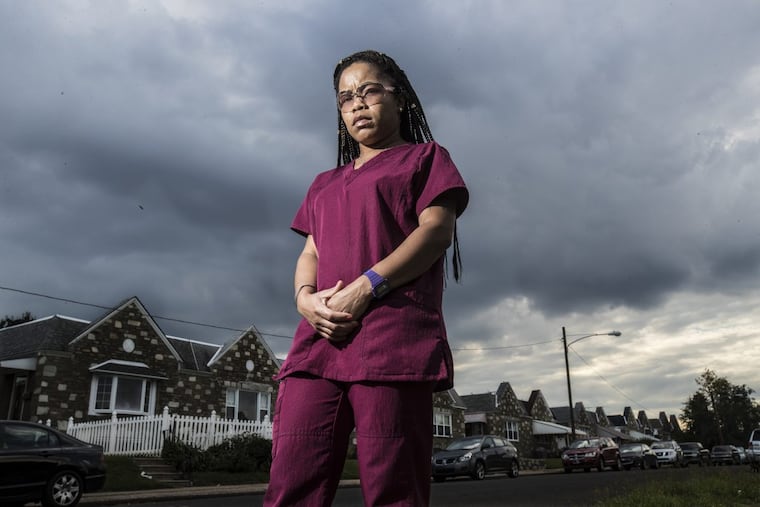Instagram intimidation threatens justice in Philly murder case | Helen Ubinas
A Philadelphia mother prays that witness intimidation won't let her son's killers go free.

When Terasa Derry's son was killed, she tumbled into the black hole many loved ones of murder victims find themselves in when seemingly everyone saw something but no one says anything.
It took a while, and persistence and pressure from her and detectives to get people to talk, and keep talking.
One witness, a friend of her son's, ended up changing his story. Suddenly, he didn't know her or her son all that well, even though they'd grown up together, watching Barney cartoons on her mother's living-room floor.
But other witnesses stood strong, and last year, two men were arrested for fatally shooting Sharif Derry on July 16, 2015. He was 23, working part time in food prep, and trying to pull his life together.
The trial was scheduled for next year. Derry prayed that in the meantime witnesses wouldn't have a change of conscience.
Then this summer, a friend sent her something that someone had posted on Instagram.
At first, Derry wasn't sure what she was looking at, so she ignored it.
But when her friend sent it again, she took a closer look. And panicked.
Someone had posted a witness' statement on social media, and it was making the rounds.
If the intent wasn't clear, the person who posted it clarified it with threatening words about snitches.
The witness was relocated. Police are investigating.
"I consider intimidation to be just short of the actual crime," said Detective Gregory Santamala of the homicide squad. "And I will not tolerate anyone trying to intimidate a good person trying to do the right thing."
Philadelphia has a long history of witness intimidation, which has evolved from face-to-face harassment to digital threats. In 2013, an anonymous Instagram account with nearly 8,000 followers drew national attention after it was found to have posted the identities of more than 30 crime witnesses. That same year, a high school student was arrested for using his Twitter account to post secret grand jury court documents and photos outing witnesses.
Social media is still employed to intimidate witnesses.
"I just think, 'How dare they?' " Derry said.
We hear about a lot of murder victims, if only fleetingly in headlines.
What we don't always hear about are the aftershocks of those murders.
A half-brother, 13 now, who has to explain to high schools that he really wants to go to that the dip in his grades wasn't because he didn't apply himself, but because he was struggling with his brother's death. He still is.
A mother coming to grips with the loss of a son who she knows lost his way, but never so much that it should have cost him his life. He mostly got into trouble for selling weed.
Two years later, she still wishes she had been home the day her son was shot down around the corner from her home on North 17th Street in West Oak Lane. Maybe she could have at least gotten to touch him one last time while he was still warm. She prays every night that fear won't be the reason her son's killers walk free.
Derry understands the fear. Often, the distance between the friends and families of a victim and the friends and family of a killer is as short as a city block, the distance between a killer and a witness, even shorter. One of the accused killers lived on Derry's street.
What Derry doesn't understand, what she just can't abide, is the belief that silence shields anyone from danger.
She concedes that her feelings on this waver, but many days, she finds herself thinking about the mothers of the men who have been charged with killing her son. Chances are, she says, if they wind up back out on the streets, they'll meet a similar fate as her son's.
"That's not going to lessen my load because, above all, I'm a mother," she said. "And their mothers are going to be sitting here having the same conversation with someone about how their sons are dead and no one is talking.
"It's a cycle that keeps going. It just keeps going."